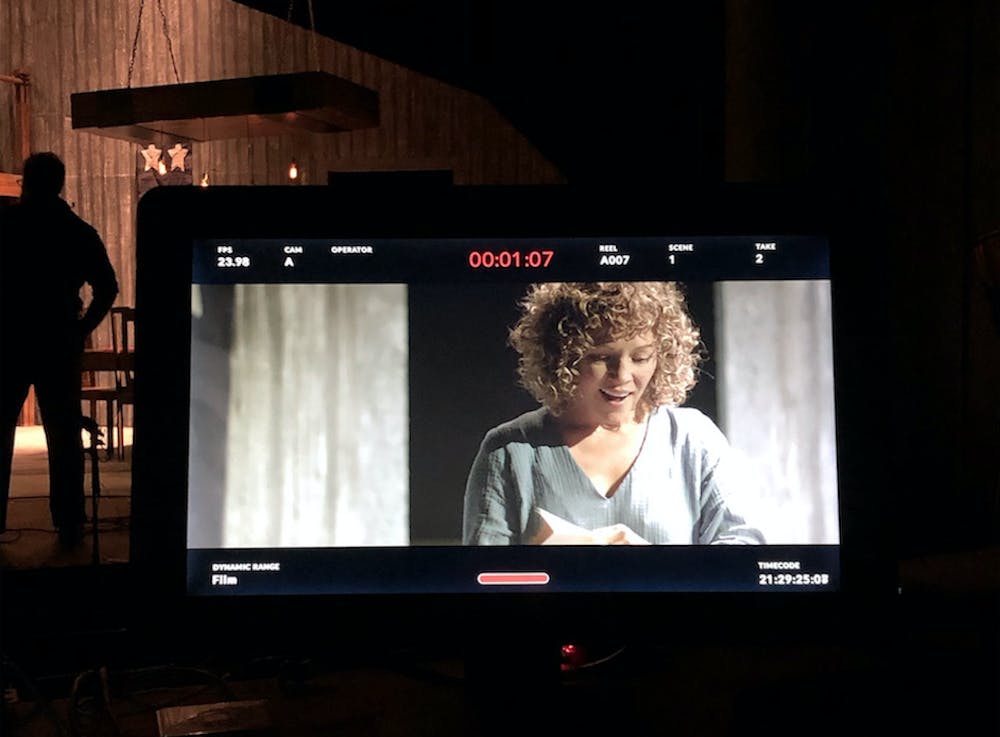The work of Shakespeare has survived yet another pandemic.
Students from the Ohio University School of Theater have performed a recorded rendition of Macbeth, directed by Dustin Brown, an OU graduate student studying directing. The performance will be opening the virtual curtain for the first time April 16 and can be streamed online through the production’s website for a limited time. The production experiments with gender while combining both modern and medieval elements, bringing a unique spin on the age-old production.
The traditionally male role of Macduff is played by Kari Willenbrink, and the role provides extra excitement when played by a woman, Brown said. Macduff is told “he” must take revenge upon his family “like a man,” Brown said, but the word “man” in the line that follows changes from the original text.
“She responds, ‘I must feel it like a woman,’” Brown said. “It was just this powerful moment of playing around with gender and Shakespeare.”
The show is also farther away from the traditional, all-white and male casting of most productions, Brown said, and includes a diverse group of talented actors with a range of experience.
Avery Pope’s role as Malcom, Brown said, adds a new depth to the character and the piece, delivering lines in a way that Brown has never seen Shakespeare presented.
“It is tormenting to see him as a young Black man going through that experience of family tragedy and then going away and getting to come back and return,” Brown said. “(Pope) being crowned king is just a really beautiful story.”
Throughout production, the actors and crew have had to overcome a host of challenges to bring their show to audiences.
Sara Keller, the costume and production designer, said there were a number of precautions she, the cast and the crew took to prevent the spread of COVID-19. Thankfully, grant money was available in order to accommodate the precautions.
“(The grant money) provided us with the opportunity to get simple things like infrared thermometers to check temperatures of everybody in the shop and anybody coming into the shop, allowing us to get extra personal protective equipment for pretty much the entire shop as well as anybody who needs to be in fitting,” Keller said. “And it really just allowed us to have a little bit more flexibility in our safety precautions.”
The school of film had a set list of COVID-19 guidelines the cast and crew followed while filming, Keller said, and adapted them to both the theatrical and outdoor spaces the production utilized.

Behind the Scene - Witches: (from left to right) Hannah McCauley as the first witch; Hannah Lunt, make-up and wig artisan, applying makeup; Hannah Woodside as third witch; Aaron Gates as second witch; Anil Srivastha, sound recordist, setting up gear; various cast and crew in the far background. This was taken at the Ridges for Macbeth's first meeting with the witches. Everyone is still wearing coats, so this is not in costume. Photo by Dusty Brown.
For many of the 15 members of the cast, including three graduate students and seven undergraduate seniors, Macbeth provided the opportunity to do one last in-person production before graduation.
With the lag of Zoom and the challenges of online productions and rehearsals, the cast was extra thankful for the opportunity to once again be together in person, even with all of the extra regulations in place.
“I think all of us really understood the value of being able to get back into a space and working in person,” Brown said. “Being able to get on stage and just have two actors seeing each other and responding off of each other was an incredible opportunity. I think they all rushed to embrace that and really make sure that we were safe and compliant with COVID precautions throughout.”
Although the experience was closer to a typical production than many others done in the past year have been, some of the hardest challenges for the cast and crew, Keller said, was adapting the work of theater artists to the process of filming.
“From one shot to the next, everything looks the same because another thing that's different from theater to film is that (film) is not usually done sequentially,” Keller said. “I think the biggest one was trying to make sure that everybody was on the same page for what was required … It really had to be day by day.”
Ohio University has a long history with Shakespeare, especially Macbeth. In a Jan. 15, 1929, edition of the Green and White campus newspaper, which preceded The Post, there is a short article about the first play performance to be given in the new MemAud: Macbeth, performed by a traveling theater company.
In an Oct. 31, 2007, edition of The Post, the School of Theater presented an “absurd” version of Macbeth titled Macbett, where the characters were rewritten to be played in the most “outrageous” way possible.
No matter its presentation, Macbeth is a story that continues to reverberate for students throughout the years, adapting itself to fit the modern student and the modern time.






